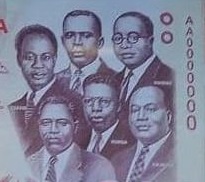On the occasion of our observance of Founders' Day in Ghana, the predictable annual debates are raging: Was there just one Founder of the nation? Or were there several Founders, whose collective efforts led to the birthing of the sovereign nation?
Well, your viewpoint depends on your point of view. If that "Founder" definition is limited to the mere declaration of Independence, then Kwame Nkrumah takes it.
However, those who actually began the struggle for self-determination would argue that when they were boldly organising strikes, marches, and piling political pressure on the British colonialists, Nkrumah was safely ensconced in the UK, far removed from the frontline action.
They would also point out that it was they, the founders of the United Gold Coast Convention, who invited Nkrumah to Ghana in the first place, urged him to come join the struggle, and actually paid for his passage to Takoradi from the UK.
Furthermore, having prepared the political environment of consciousness and springboard for the struggle, they then appointed Nkrumah General Secretary of the UGCC. They put him on salary out of their own pockets, introduced him to his Ghanaian political constituency, and sponsored his early political activities.
If the politically savvy Nkrumah then fell out with his political benefactors, breaking off to form the CPP, and went on to win the election, does it negate the crucial contribution of the pioneering work of the others?
The question is: Where would Nkrumah have been, without the difficult pioneering work and invitation to Ghana by the UGCC? Your guess is as good as mine.
Ghana is grateful to the other members of the Big Six, for recruiting Nkrumah to join the struggle, sponsoring him, and giving him a political platform to shine. Nkrumah's subsequent activism and political advocacy on the Pan-African front, was indeed a victory for all of Ghana.
But the attempts to erase the contribution of others to our independence, is not corroborated by the public record. For instance, the city of Accra itself, was the major beehive of political activity in West Africa in the 1940s and 1950s. And it is inconceivable that two of Accra's illustrious Ga sons, Ako-Adjei and Obetsebi-Lamptey, would be denied their place in the account of Ghana's independence.
In my alma mater, Achimota School (incidentally the same school Nkrumah, Ofori-Atta and Akufo-Addo attended) an annual Founders' Day is also celebrated. The day honours the three men whose COLLECTIVE efforts birthed the school: James Kwegir Aggrey, Rev. A.G. Fraser, and Governor Gordon Guggisberg.
While the idea for the school could not have occurred to all three at the very same time, they each played different roles to bring the vision to pass. And Achimotans honour ALL three for their pioneering work, and rightly so.
Indeed, the road to Independence can be likened to an Olympic relay. The mere fact that the anchor leg crosses the finish line, does not make him solely responsible for the victory. It is a team effort. And this accounts for the awarding of medals to the entire relay team, and not just the anchor.
Without the preliminary work and efforts of those who handed over the baton to Nkrumah, he could not have crossed the line. In fact, he would have been nowhere near the stadium of action without their invitation. Fact.
As with the US, it was the collective efforts of several men, which led to independence from Britain. To erase them from the picture, is both historically inaccurate, and intellectually dishonest.
Therefore, regardless of our personal affinities for one side or the other of the UP/CPP divide, we ought not to negate the historical fact that both political traditions originated from the UGCC.
For the record, the other five members of the "Big Six": Ako-Adjei, Obetsebi-Lamptey, Danquah, Akufo-Addo, and Ofori- Atta, whose pioneering work is today being denied by some, were the main political foundation of Ghana's independence story, and indeed, of Nkrumah's own political rise.
Remember, they were collectively called the "Big Six" for a reason. Thankfully, no new narrative driven by tribal sentiment or political affinity, can erase that sacred history. ©2024 C.Y. Pitt.

